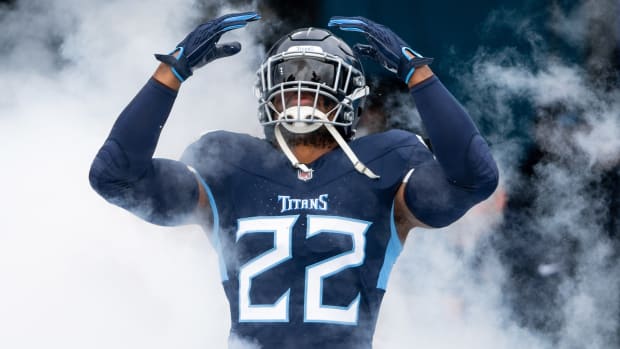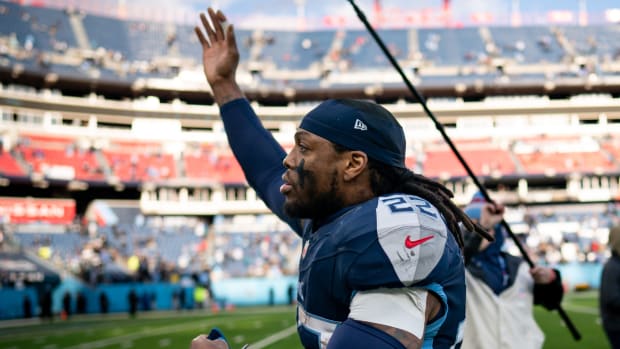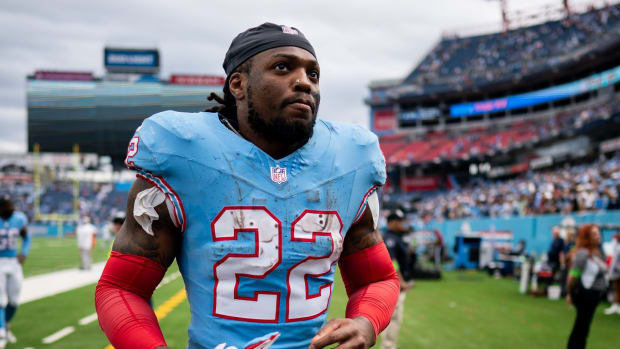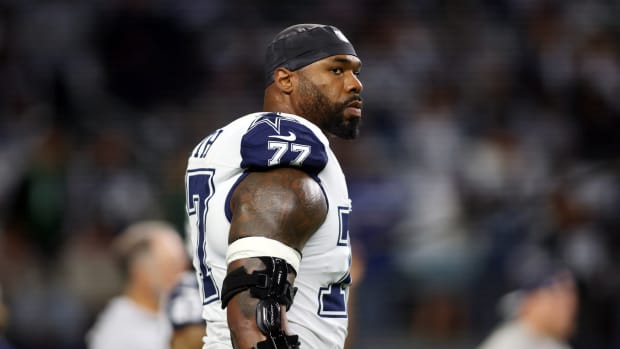Imagining An Extension That Would Make Titans, Henry Happy
NASHVILLE – The clock is ticking. That much is certain.
Yet there is nothing to indicate that blood is boiling. Not with the Tennessee Titans. Not with Derrick Henry and his representatives.
Just days remain before the deadline for the sides to agree to a long-term contract extension that would keep the NFL’s 2019 rushing champion from playing the 2020 season on a one-year franchise tender at $10.278 million. If nothing is worked out by 3 p.m. (CDT) Wednesday, the Titans and Henry will have to try again next year.
The fact that they have gotten to this point is not necessarily a sign that talks have been contentious. It simply means time has not run out.
“I think the conversations have been positive between me and the reps there,” general manager Jon Robinson said last month. “Just trying to find some common ground. I’ve said it before, I’ll say it again, (Henry) is an important part of what we do. Just trying to find the spot where we all need to be, where we all want to be.”
So, if everyone is happy – relatively speaking – at this point, how would a long-term deal that leaves both sides happy look?
Guaranteed money: For the player, this always is a primary concern. Currently, there are five running backs – Saquan Barkley, Christian McCaffrey, Ezekiel Elliott, Leonard Fournette and Le’Veon Bell – whose current contracts include at least $27 million fully guaranteed. Barkley tops that list with $31,194,750 fully guaranteed by the fact that he was the second overall pick in the 2018 NFL Draft. McCaffrey signed an extension earlier this offseason that fully guarantees him $30,062,500.
It makes sense that Henry would want to be assured of least $30 million in his new deal.
Limited term: This is a significant issue for the team particularly at running back, a position at which even the best players typically experience a massive drop in performance at some point. Currently, there are only seven running backs in the NFL with contracts that extend beyond the next four seasons – and four of those will be rookies in 2020.
As much as the Titans value Henry, they won’t want to risk paying him for a number of seasons of diminishing numbers. Four years – five at the absolute most – would put them at ease.
Performance incentives: Henry is coming off a year in which he led the NFL in rushing, made it to the Pro Bowl for the first time and was named a second-team All-Pro. There is every reason to think he will achieve one or more of those things (or maybe even be a first-team All-Pro) again in the next couple years, and it would nice for them to pay off, literally.
Assuming Henry gets the guaranteed money, these don’t need to be massive payouts, which can create unexpected salary cap issues. But a little incentive always makes things interesting.
Cap comfort: This is a consideration for every team with pretty much every contract. The Titans already have 39 percent of the 2020 salary cap tied up in five players – Ryan Tannehill, Taylor Lewan, Malcolm Butler, Rodger Saffold and Kevin Byard. Chances are they want to make sure Henry’s 2020 cap number does not exhaust the bulk of the remaining space.
One way to satisfy the team’s needs in this regard is to minimize the base salary this season and pay more in that regard in subsequent years. Byard, for example, is in the first year of a five-year extension, for which the lowest base salary and cap numbers are this season. Lewan, on the other hand, has his biggest numbers this year, the second of his current contract.
Comparison shopping: Nothing makes a player happier than the idea that he is the highest-paid at his position. The Titans under Robinson have shown they are happy to accommodate their guys in that regard. In 2018, Lewan’s deal raised the standard for tackles in terms of total value and annual average salary. In 2019, Byard’s extension did the same for the annual average salary of safeties.
The bottom line: Taking all this into consideration – and without getting too detailed – how about a four-year, $65 million deal with $36 million fully guaranteed ($24 million signing bonus, $8 million 2021 roster bonus and $4 million 2020 salary)? That actually would lower Henry’s 2020 salary cap number slightly but at an average annual value of $16.25 million, it would put him ahead of McCaffrey ($16.015 million) for the highest-paid running back. With performance incentives, the total value could grow to $75 million.
Who wouldn’t be happy with that?




